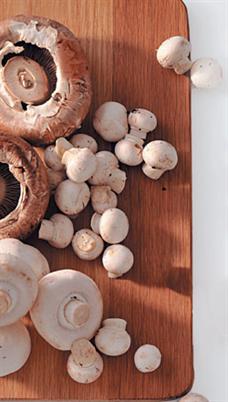The humble mushroom can be found in many forms, from the exotic to your trusty button variety, but no matter which you prefer, they are all jam-packed with goodness.
By Dominique Brown
The expert
Dr Martmari van Greuning is the general manager of Sylvan Africa, which supplies mushroom spawn to the mushroom industry. Martmari serves on the council of the South African Mushroom Farmers’ Association (SAMFA) and specifically looks after local mushroom research. She tells us why you should be eating more mushies.
Back to the beginning
Mushrooms have long been revered as a mystical and flavoursome food, with the ancient Greeks even referring to them as ‘food of the gods’. The pharaohs of Egypt reserved them solely for royalty and the Chinese consider mushrooms to have medicinal properties. We tend to group mushrooms with vegetables when, in fact, they exist in their own category as fungi. This means that, unlike veggies, they aren’t able to produce their own food through photosynthesis, but depend on organic matter to survive.
Wonder food
Because of their unique classification, mushrooms also offer a distinctive nutrient profile. They contain nutrients not found in many plants as well as those found in many animal products. Nutrient composition is dependent on the variety, cultivation technique and maturity at harvest. Vegetarians should definitely increase their intake as mushrooms contain 3,3g per 100g of protein – more than most vegetables. They’re also low in carbs and kilojoules.
Full-on fibre
Need to get your daily dietary fibre intake but trying to cut down on bread? Just 100g of mushrooms will provide 2,7g of fibre when cooked – that’s more than a slice of whole-wheat bread. The fibre in mushrooms is mainly insoluble. Chitin, found in the cell walls of fungi, has been associated with maintaining healthy blood cholesterol levels, so mushrooms not only have no cholesterol, they also have a cholesterol-lowering effect.
B is for beneficial
Various B vitamins are abundant in mushrooms: the amount is far greater than that of other vegetables and comparable with animal protein sources such as meat and milk. B vitamins play a role in essential metabolic processes and the production of hormones, as well as controlling energy release from protein, fat and carbohydrates.
Helping your heart
If the doctor has taken to lecturing you on the need to lower your salt intake to reduce the risk of heart disease, then you should definitely be reaching for mushrooms. Mushrooms contain only 14mg of sodium per 100g, falling into the bottom end of the low-sodium range. Considering that a low-salt diet allows between 400 and 1 000mg of sodium per day, the low-sodium content of fresh mushrooms is even more impressive.
And there’s more…
Mushrooms are rich in antioxidants; they contain selenium in quantities much higher than any other plant food. They also contain phytochemicals that are found to specifically suppress breast and prostate cancer. Mushrooms contain a fatty acid called conjugated linoleic acid, which has the ability to inhibit two enzymes that have been linked to cancer, namely aromatase and 5-alpha-reductase.
Don’t miss the Soweto Mushroom Festival from 11am to 3pm on 27 October 2012 at the Maponya Mall, Soweto. Call 011-325-6006 or visit www.mushroominfo.co.za.
Click on the links below for delish mushroom recipes:
Portobello mushroom burger and chips
Mixed mushrooms and ginger stir-fry
Creamy mushroom penne

